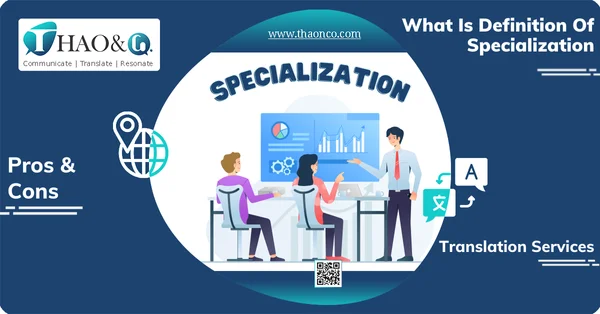For businesses aiming to optimize business performance, specialization has emerged as a highly effective strategy. But what is specialization? Why has it become a cornerstone of business strategy for so many organizations today?
In this article, Thao & Co. explores the concept of specialization and its role in achieving business excellence.
Specialization refers to focusing on a specific, limited area within a broader field. It can apply to various aspects of business, including:
For instance, instead of manufacturing a wide variety of goods, a company may specialize in producing a few key products that cater to the specific needs of its target customers.
Explore More: What Are Internationalization and Globalization?
Specialization is widely embraced by businesses for its notable benefits:
Despite its advantages, specialization also presents potential drawbacks:
The decision to specialize requires careful consideration and strategic planning. Identifying the right area of focus and investing in a modern, flexible management system is critical for success.
Learn More: What is Standardization?

Specialization plays a vital role across diverse sectors, such as economics, technology, and manufacturing. However, its ultimate goal is to improve efficiency, enhance productivity, and ensure high-quality results in each area of expertise.
Below are practical examples demonstrating how specialization operates in different contexts:
To successfully integrate into the global market, businesses should develop a modern and adaptable specialization strategy. The following steps outline a roadmap to achieve this:
A clear and comprehensive plan is essential, covering all critical aspects such as:
The plan should be informed by extensive market research, competitor analysis, and a clear understanding of the company’s current strengths and workforce capabilities.
Prioritize employee training to build skills, enhance professional expertise, and foster a sense of discipline. Assign roles and responsibilities that align with each individual’s specialized strengths.
Fostering a supportive and professional work environment with competitive benefits, creativity encouragement, and continuous learning opportunities will help attract and retain top talent.
Harnessing monitoring and management software can help businesses streamline operations and optimize workforce efficiency.
Conduct regular performance evaluations and make necessary adjustments to adapt to market shifts and respond to internal challenges.
The strategies provide insights into “what is specialization?” and its significance. It is clear that channeling resources into cultivating specialized expertise is a key driver in boosting both productivity and operational efficiency.
For businesses aiming to expand globally, it is essential to have a reliable language partner. At Thao & Co., we bridge the gap between businesses and the international market, ensuring you stay ahead of trends while reaching new audiences.

Get in touch with Thao & Co. today to experience our top-quality translation services!